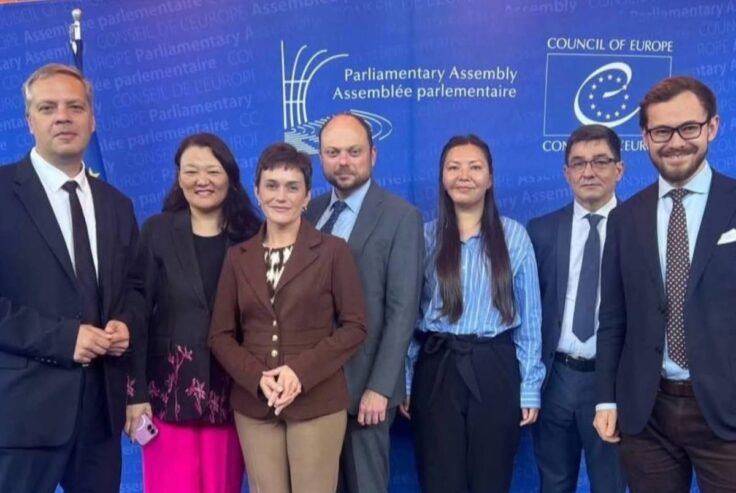
Russia’s FSB has opened a criminal case, accusing Mikhail Khodorkovsky and members of the Anti-War Committee of attempting a violent takeover and forming a terrorist organization. The committee includes politicians, public figures, journalists, writers, and scholars. In addition to Sergei Guriev, dean of the London Business School; Elena Lukyanova, doctor of legal sciences; Yuri Pivovarov, academician of the Russian Academy of Sciences; and Konstantin Chumakov, professor at George Washington University, the list of the accused also includes Eugene Koonin, head of the Evolutionary Genomics Laboratory at the U.S. National Institutes of Health, member of the U.S. National Academy of Sciences, and member of the T-invariant coordinating council, as well as tech entrepreneur Mikhail Kokorich, founder and CEO of Destinus. T-invariant has learned just how unexpected these charges of especially grave crimes were for them and how they might impact their lives.
Top news on scientists’ work and experiences during the war, along with videos and infographics — subscribe to the T-invariant Telegram channel.
“I’ve long understood that Russian intelligence agencies are interested in my activities: after all, my company is one of Europe’s and Ukraine’s leaders in multi-technology solutions,” says Mikhail Kokorich. “If they’d asked me earlier whether I expected a criminal case, I’d have said: yes, I do.”
T-invariant: Russia’s Anti-War Committee was formed in 2022, at the start of the war. Why do you think the case has been opened now?
MK: Repression comes in waves. And there aren’t that many more people left to target. Everyone knows that in democratic countries, this kind of charge — especially phrased this way — will be seen as yet another example of the utter degradation of Russia’s law enforcement system. But the FSB only got around to it now.
T-i: How real a threat does the Anti-War Committee’s work pose to Russia’s authorities?
MK: Any organized activity opposing the regime in Russia — and taken seriously in the West — poses a threat to those in power. The Kremlin understands that in a year or two, or maybe five, their time will come. So any group that has legitimacy in the eyes of the West (and there aren’t many such Russian groups left; the Anti-War Committee is one of them) is dangerous. By accusing our group of organizing terrorism and plotting a power grab, they’re trying to cut off even the minimal ties from the Russian side, to seal off any remaining channels that still connect us to Russia.
T-i: Why didn’t they simply designate the Anti-War Committee as an “undesirable organization,”as they’ve done so many times before when they want to block Russians from engaging with some group? You’re being charged with attempting a violent seizure of power — what could be the basis for that?

MK: It might have to do with the fact that the committee, representing Russians, started to build its own independent channels of communication with international organizations, particularly with the Parliamentary Assembly of the Council of Europe (PACE). We don’t have electoral legitimacy, of course, but oddly enough, the Anti-War Committee may be seen as more legitimate in the eyes of the West than the current Russian government itself.
And with this accusation, the Kremlin is trying to show that anyone who dares to engage in independent backchannel talks with European institutions on behalf of Russians — without Kremlin approval — members of organizations deemed to be exerting a “bad influence” on Russian residents. The point is to stamp out any potential activity that encroaches on the functions of the current regime. Only the Kremlin can authorize Russians to negotiate with Europe. The Russian authorities see the Anti-War Committee’s actions as an assault on their own sovereignty. That’s why they view what we do as a direct attack on them.
T-i: What consequences might this criminal case have for you personally?
MK: Because of the work I’ve been doing since the war began, I stopped long ago planning trips through countries that might extradite Russians to Russian intelligence. At a certain point, I even quit going to the United Arab Emirates. I still traveled there early in the war, but there had already been extradition cases, so I stopped. I also avoid many Asian countries where Russian intelligence might quietly arrange to hand over Russians — for instance, Thailand. For the same reason, I don’t fly through Serbia. Naturally, I steer clear of CIS (Commonwealth of Independent States) countries. I visit Ukraine fairly often, and — strange as it might sound — when it comes to security, it’s a more reliable place for me. So I’ve been living this way for a while now and am fully aware of the risks I face.
For Eugene Koonin, the news of the criminal case came as a complete shock: “I heard about it from you. But it was clear that the intelligence services would take an interest in the Anti-War Committee. I wasn’t a particularly active member, but now I’m genuinely glad to be part of it.”
T-i: Russia’s Anti-War Committee is accused of funding Ukrainian paramilitary units deemed terrorist organizations in Russia and plotting a violent seizure of power. How does that square with the committee’s actual activities? Did you ever discuss a violent power grab with your colleagues?
EK: Never. At least, I never heard anything about it, and I can’t even imagine such a thing. It’s so outlandish that I see this accusation as something born of its authors’ paranoid delusions — though of course I understand it’s deliberate nonsense being hyped up.
T-i: But why bring the case now?
EK: I don’t know the real reason, but it seems natural to link it to the new wave of American aid to Ukraine, the delivery of Tomahawk missiles, and the sense of threat hanging over Russia’s regime. They see a real threat in that, and they’re kicking the dog, so to speak.